Financial News
Brixton Metals Discovers Multiple Porphyry Systems at the North Target on its Thorn Project
VANCOUVER, British Columbia, Dec. 16, 2024 (GLOBE NEWSWIRE) -- Brixton Metals Corporation (TSX-V: BBB, OTCQB: BBBXF) (the “Company” or “Brixton”) is pleased to announce North Target drill hole results of the 2024 season from its wholly owned Thorn Project located in NW British Columbia, Canada. The Thorn Project is an underexplored copper-gold porphyry district with many large scale exploration target areas identified.
Highlights
- Brixton Metals’ maiden drill program at the North Target has intercepted a Mo-Cu porphyry system with mineralization starting from surface consisting of:
- Multiple generations of porphyry-style quartz and quartz-anhydrite veins hosting molybdenite, pyrite, and chalcopyrite accompanied by potassic alteration halos
- Anomalous copper and molybdenum within multi-kilometer scale alteration zones of phyllic, potassic, and propylitic alteration centered around multi-phase crowded porphyritic diorites
- Multiple generations of porphyry-style quartz and quartz-anhydrite veins hosting molybdenite, pyrite, and chalcopyrite accompanied by potassic alteration halos
- A ground magnetotelluric geophysical survey has identified numerous conductive features that correlate with zones of hydrothermal alteration
- Geochronology sampling highlights discovery potential of Thorn Project with multiple metallogenic epochs identified
Vice President of Exploration, Christina Anstey, stated, “The results from the North Target highlight the extraordinary discovery potential of the Thorn Project. Intersecting multiple porphyry systems in an area that has seen minimal historical exploration is a testament to the strength of our technical approach. These early findings not only confirm the presence of a robust mineralized system, but also set the stage for further exploration to uncover higher-grade zones and additional targets across this expansive and underexplored district.”
Figure 1. Thorn Project Location Map with Copper Geochemistry.
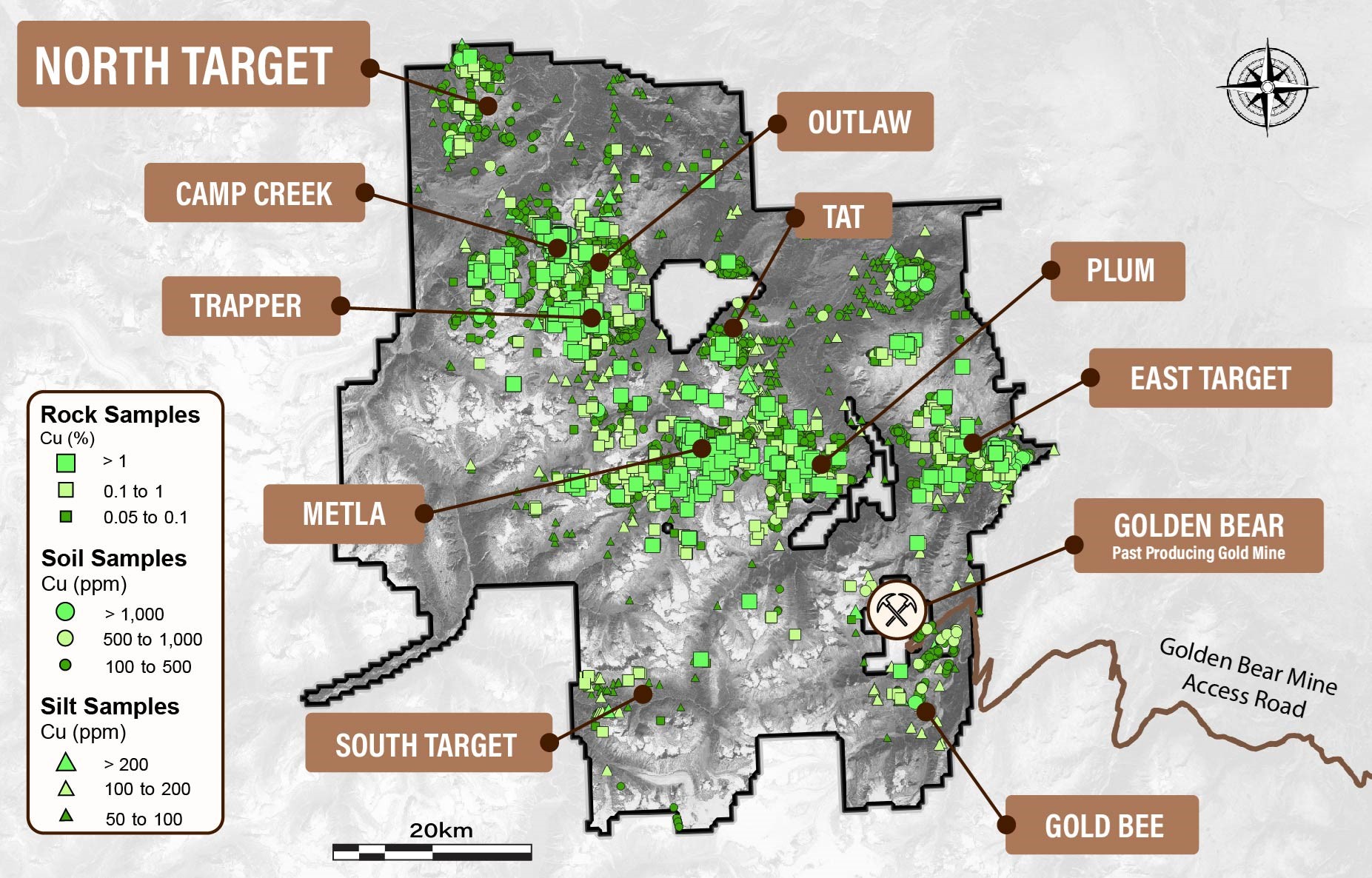
Table 1. Select Assay Intervals for Drilling at the North Target.
| Hole ID | From (m) | To (m) | Interval (m) | Mo (%) | Cu (%) | ||
| THN24-312 | 12.00 | 650.00 | 638.00 | 0.023 | 0.04 | ||
| including | 401.00 | 650.00 | 249.00 | 0.028 | 0.03 | ||
| including | 595.00 | 650.00 | 55.00 | 0.047 | 0.05 | ||
| THN24-313 | 12.00 | 421.00 | 409.00 | 0.013 | 0.06 | ||
| including | 202.40 | 219.28 | 16.88 | 0.019 | 0.11 | ||
| and including | 275.00 | 294.00 | 19.00 | 0.011 | 0.12 | ||
| THN24-296 | 491.00 | 530.00 | 39.00 | 0.005 | 0.04 | ||
| THN24-298 | No Significant Results | ||||||
HQ size core samples were cut in half and sampled predominantly at 1.5m intervals. Assay values are weighted averages. The true width of the mineralized intervals has not yet been determined.
Figure 2. Plan Map for the North Target.
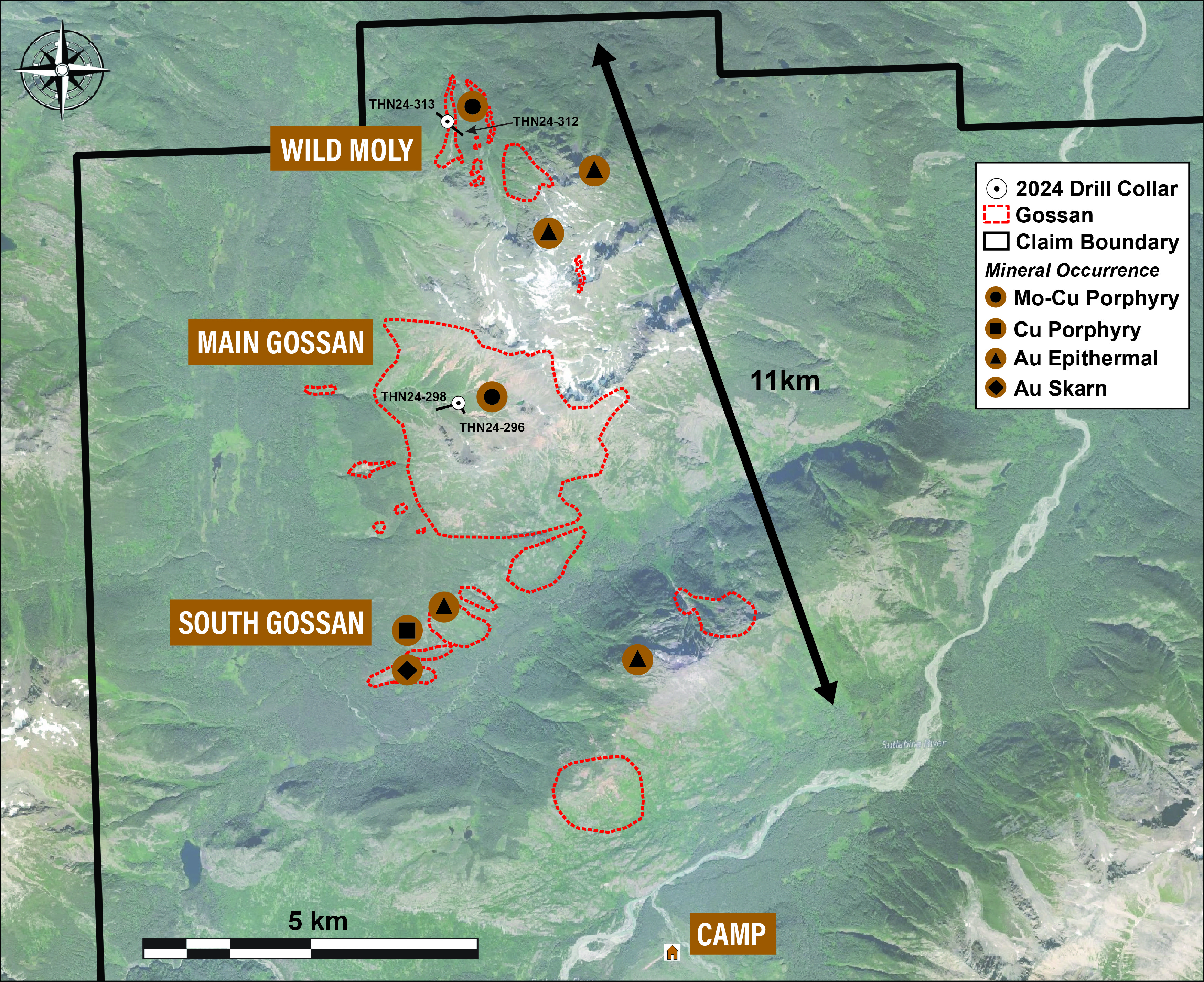
Figure 3. Plan Map for the North Target with 2024 MT Geophysical Survey at 300m depth below surface.
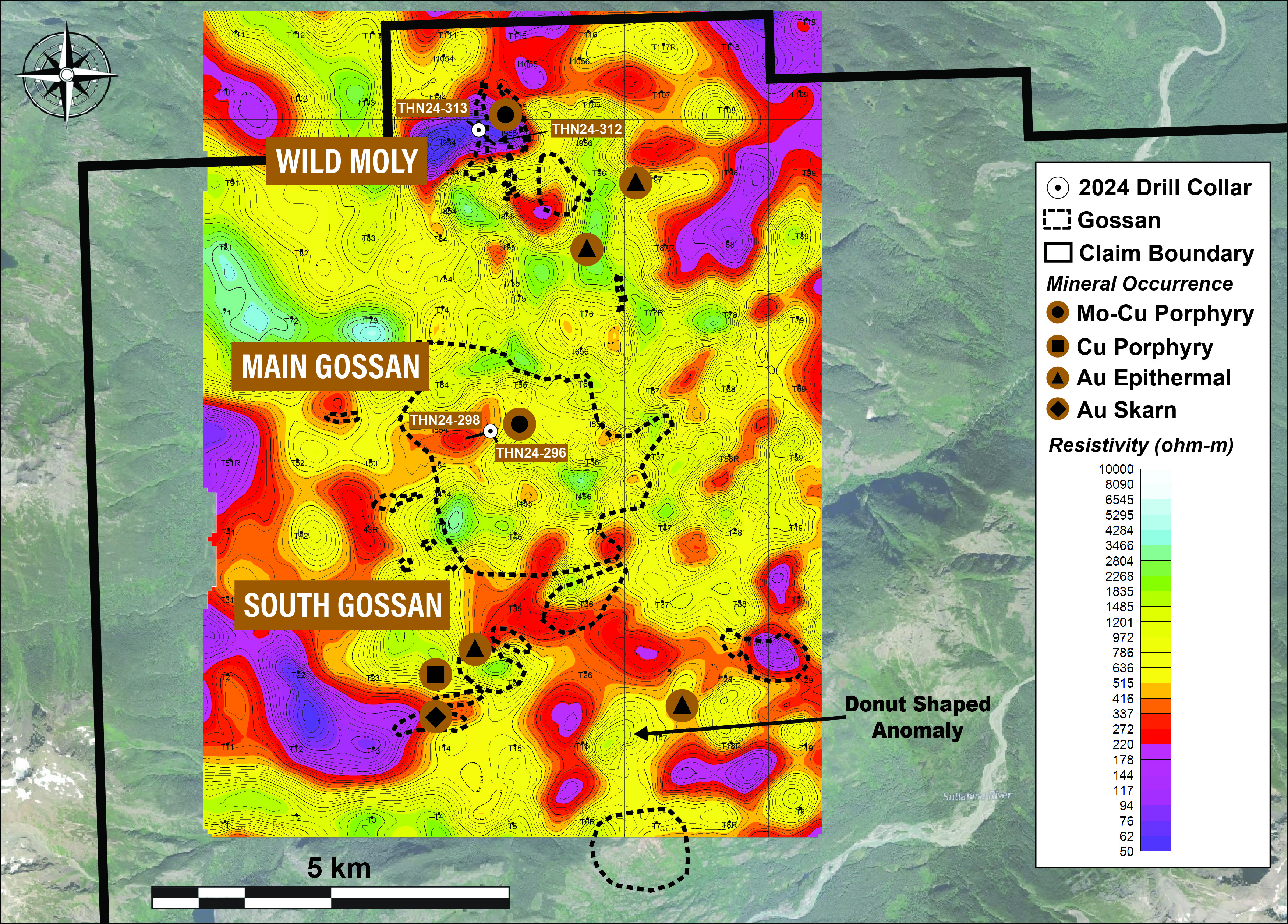
Technical Discussion
The North Target is located approximately 10km northwest of the Camp Creek Porphyry Target. Prior to the 2024 field season, exploration at the North Target has been limited to small and sporadic surficial sampling programs and has never been drilled. Through compilation of historic work and geological mapping by Brixton Metals, multiple porphyry, epithermal, and skarn mineral occurrences accompanied by large alteration footprints have been identified within a north-northwest trending 11km by 4km area, highlighting the potential for a large mineral system. The North Target is underlain by Stuhini Group upper Triassic mafic volcanics and Laberge Group lower Jurassic sedimentary rocks. These units are intruded by multiple Late Cretaceous to Eocene intrusions.
The 2024 field season commenced with a SPARTAN Magnetotelluric (MT) geophysical survey consisting of a 108 station grid with 1-kilometer spacing. This was followed up by 4 drill holes at the Wild Moly and Main Gossan target areas for a total of 2,266m.
Wild Moly
Wild Moly has a surface expression of strong quartz-sericite-pyrite alteration with quartz-molybdenite-chalcopyrite veins and a coincident low resistivity feature identified from the MT survey. This target was tested with two drill holes for a total of 1,071m leading to the discovery of a previously unrecognized Mo-Cu porphyry system. While copper grades average 0.04% in THN24-312 and 0.06% in THN24-313, narrow intervals have returned >0.1% Cu and further work will evaluate the potential for zones of higher-grade copper. With an at least 1.8km by 1.2km area of phyllic alteration mapped at surface, the system remains open in all directions.
THN24-312 was drilled at an azimuth of 128.2 degrees, a dip -65.0 degrees, and to a depth of 650m, targeting the highest density of mapped quartz veins and center of the low resistivity anomaly. The drill hole collared into a crowded biotite-quartz-feldspar diorite porphyry from surface to 602.85m where Stuhini mafic volcanic tuffs and breccias were intersected until end of hole. Mineralization occurs in quartz-anhydrite veins with pyrite-molybdenite and rare chalcopyrite. Potassium feldspar and biotite alteration forms halos to veins with a pervasive sericite-pyrite overprint. THN24-312 returned 638.00m of 0.023% Mo, 0.04% Cu from 12.00m, including 55.00m of 0.047% Mo, 0.05% Cu from 595.00m.
Figure 4. Photos of Mineralized HQ-Sized Drill Core from THN24-312.

THN24-313 was drilled from the same pad and collared at an azimuth 308.1 degrees, a dip of -65.1 degrees, and to a depth of 421m, testing a copper-in-soil anomaly. The hole collared into the diorite porphyry until 116.35m where the lithology became Stuhini mafic volcanic dominant with sub-50m intervals of porphyry. As with THN24-312, porphyry-style mineralized quartz veins with potassic halos were intersected throughout until alteration became chlorite-epidote-magnetite-pyrite dominant at depth where it is interpreted that the hole transitioned to the margins of the porphyry system. THN24-313 returned 409.00m of 0.013% Mo, 0.06% Cu from 12.00m, including 19.00m of 0.12% Cu, 0.011% Mo from 275.00m. The best copper values occur within mafic volcanics at the contact with the diorite porphyry.
Figure 5. Photos of Mineralized HQ-Sized Drill Core from THN24-313.

Figure 6. Cross-Section of Wild Moly Drill Holes.
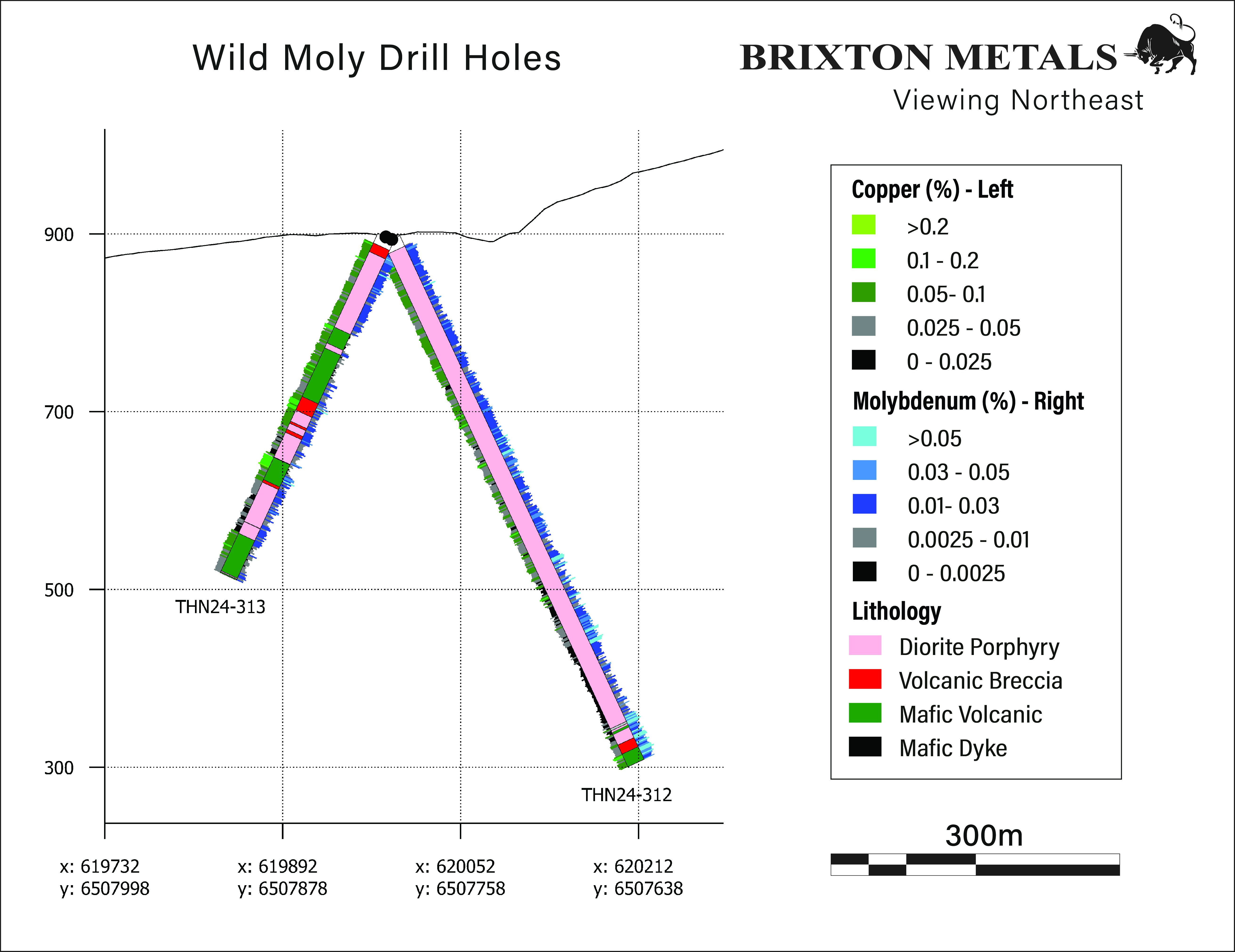
Main Gossan
The Main Gossan consists of a 2.5km by 3.2km altered area with propylitic, sericitic, and locally potassic alteration assemblages, widespread pyrite, and isolated occurrences of chalcopyrite, copper oxides, and molybdenite at surface. It is underlain by Laberge Group sedimentary rocks which are cut by multiple intrusive phases. The Main Gossan was tested with two holes totaling 1,195m targeting areas where porphyry-style quartz veins were observed on surface with a coincident northeast trending conductive feature. The 2024 drilling has confirmed the presence of a porphyry system at the Main Gossan.
THN24-296 was collared at an azimuth of 159.5 degrees, a dip of -68.8 degrees, and to a depth of 530m and THN24-298 was collared from the same pad at an azimuth of 245.1 degrees, dip of -60 degrees, and to a depth of 665m. Both holes collared into Laberge mudstone to conglomerate horizons which are intruded by a hornblende-biotite-quartz-feldspar diorite porphyry. Chlorite-epidote-magnetite-pyrite was the dominant alteration assemblage with structurally controlled zones of sericite-pyrite overprint. Mineralization consisted of disseminated pyrite, commonly >5%, with rare quartz-molybdenite and quartz-sphalerite-galena-chalcopyrite veins. Both holes ended in an intrusive breccia with elevated copper values, including THN24-296 which returned 39.00m of 0.04% Cu and 0.005% Mo from 492.50 meters to end of hole. While the Main Gossan holes returned no significant intercepts, the widespread propylitic alteration suggests drilling intersected the margins of a concealed porphyry system.
Figure 7. Photos of Mineralized HQ-Sized Drill Core from THN24-296.

Figure 8. Photos of Mineralized HQ-Sized Drill Core from THN24-298.

Figure 9. Cross-Section of Main Gossan Drill Holes.
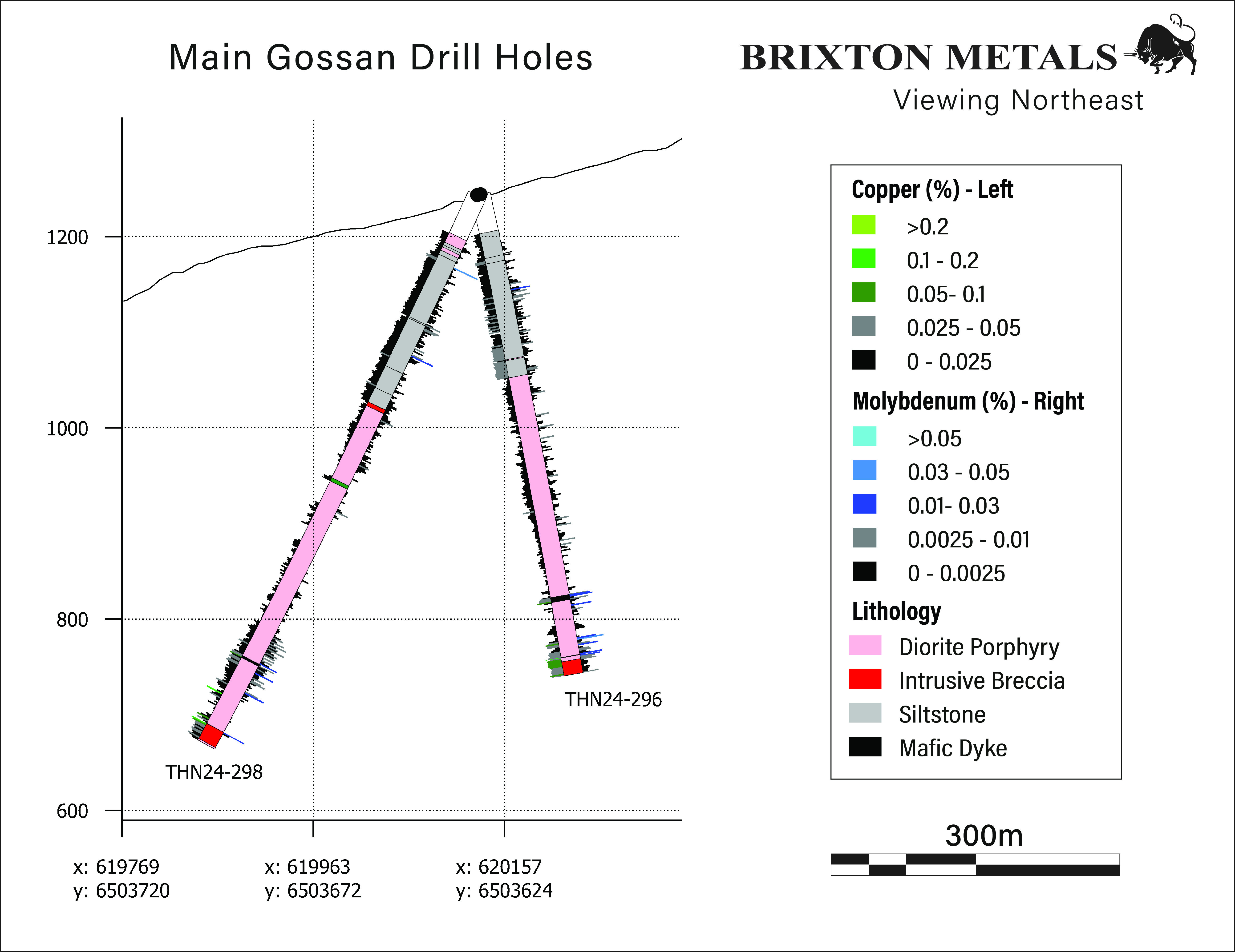
Geophysics
The MT survey has identified numerous near-surface conductive features across the target area. With the survey successfully highlighting the Wild Moly porphyry discovery as a resistivity low, further ground-truthing of other anomalies is planned for the 2025 field season. One resistive feature of interest is a 3km wide donut-shaped conductor located at the south end of the target area (Figure 3). The flanks of the conductor correspond with quartz-sericite-pyrite alteration and the central portion is interpreted to be covered by post-mineral volcanics. The geophysical data will be further evaluated and will incorporate petrophysical properties collected on drill core and surface samples into a constrained inversion.
Geochronology
A Re-Os geochronology sample from a molybdenite vein at the Main Gossan has returned an age date of 58 +/- 0.2 Ma. While mineralization at the Main Gossan and Wild Moly are interpreted to be Paleocene in age, 3km south of the Main Gossan, U-Pb zircon age dating of a porphyritic intrusion with weak chalcopyrite mineralization has returned 85.5 +/- 0.7 Ma, coeval with the mineralizing PX porphyry at the Camp Creek Porphyry Target. Along with known Late Triassic mineralization in the central portions of the property and Neogene epithermal mineralization adjacent to the Thorn Project at Newmont’s Hearts Peak Property, these results highlight the discovery potential of the area with multiple metallogenic epochs identified.
Conclusion
The 2024 exploration program at the North Target has been successful through the integration of multiple dataset types into a maiden drill program that intersected a molybdenum-copper porphyry at the Wild Moly and the margins of a porphyry system at the Main Gossan. With only a small portion of the 11km by 4km area of porphyry style alteration tested, further work will utilize geochemistry from surface and drilling data, hyperspectral data, and geophysics to target for other porphyry centers.
Table 2. Collar Information for 2024 North Target Drilling.
| Hole ID | Easting | Northing | Elevation (m) | Azimuth | Dip | Depth (m) |
| THN24-296 | 620134 | 6503632 | 1244 | 159.5 | -68.8 | 530.00 |
| THN24-298 | 620130 | 6503633 | 1243 | 245.1 | -60.0 | 665.00 |
| THN24-312 | 619989 | 6507802 | 894 | 128.2 | -65.0 | 650.00 |
| THN24-313 | 619984 | 6507807 | 897 | 308.1 | -65.1 | 421.00 |
Quality Assurance & Quality Control
Quality assurance and quality control protocols for drill core sampling was developed by Brixton. Core samples were mostly taken at 1.5m intervals. Blank, duplicate (lab pulp) and certified reference materials were inserted into the sample stream for at least every 20 drill core samples. Core samples were cut in half, bagged, zip-tied and sent directly to ALS Minerals preparation facility in Whitehorse, Yukon or Langley, British Columbia depending on available lab capacity. ALS Minerals Laboratories is registered to ISO 9001:2008 and ISO 17025 accreditations for laboratory procedures. Samples were analyzed at ALS Laboratory Facilities in North Vancouver, British Columbia for gold by fire assay with an atomic absorption finish, whereas Ag, Pb, Cu and Zn and 48 additional elements were analyzed using four acid digestion with an ICP-MS finish. Over limits for gold were analyzed using fire assay and gravimetric finish. The standards, certified reference materials, were acquired from CDN Resource Laboratories Ltd., of Langley, British Columbia and the standards inserted varied depending on the type and abundance of mineralization visually observed in the primary sample. Blank material used consisted of non-mineralized siliceous landscaping rock. A copy of the QAQC protocols can be viewed at the Company’s website.
Qualified Person (QP)
Mr. Daniel Guestrin, P.Geo., is a Senior Project Geologist for the Company who is a qualified person as defined by National Instrument 43-101. Mr. Guestrin has verified the referenced data and analytical results disclosed in this press release and has approved the technical information presented herein.
About Brixton Metals Corporation
Brixton Metals is a Canadian exploration company focused on the advancement of its mining projects. Brixton wholly owns four exploration projects: Brixton’s flagship Thorn copper-gold-silver-molybdenum Project, the Hog Heaven copper-silver-gold Project in NW Montana, USA, which is optioned to Ivanhoe Electric Inc., the Langis-HudBay silver-cobalt-nickel Project in Ontario and the Atlin Goldfields Project located in northwest BC which is optioned to Eldorado Gold Corporation. Brixton Metals Corporation shares trade on the TSX-V under the ticker symbol BBB, and on the OTCQB under the ticker symbol BBBXF. For more information about Brixton, please visit our website at www.brixtonmetals.com.
On Behalf of the Board of Directors
Mr. Gary R. Thompson, Chairman and CEO
For Investor Relations inquiries please contact: Mr. Michael Rapsch, Senior Manager, Investor Relations. email: michael.rapsch@brixtonmetals.com or call: 604-630-9707
Neither the TSX Venture Exchange nor its Regulation Services Provider (as that term is defined in the policies of the TSX Venture Exchange) accepts responsibility for the adequacy or accuracy of this release.
Information set forth in this news release may involve forward-looking statements under applicable securities laws. Forward-looking statements are statements that relate to future, not past, events. In this context, forward-looking statements often address expected future business and financial performance, and often contain words such as “anticipate”, “believe”, “plan”, “estimate”, “expect”, and “intend”, statements that an action or event “may”, “might”, “could”, “should”, or “will” be taken or occur, including statements that address potential quantity and/or grade of minerals, potential size and expansion of a mineralized zone, proposed timing of exploration and development plans, or other similar expressions. All statements, other than statements of historical fact included herein including, without limitation, statements regarding the use of proceeds. By their nature, forward-looking statements involve known and unknown risks, uncertainties and other factors which may cause our actual results, performance or achievements, or other future events, to be materially different from any future results, performance or achievements expressed or implied by such forward-looking statements. Such factors include, among others, the following risks: the need for additional financing; operational risks associated with mineral exploration; fluctuations in commodity prices; title matters; and the additional risks identified in the annual information form of the Company or other reports and filings with the TSXV and applicable Canadian securities regulators. Forward-looking statements are made based on management’s beliefs, estimates and opinions on the date that statements are made and the Company undertakes no obligation to update forward-looking statements if these beliefs, estimates and opinions or other circumstances should change, except as required by applicable securities laws. Investors are cautioned against attributing undue certainty to forward-looking statements.
Photos accompanying this announcement are available at:
https://brixtonmetals.com/wp-content/uploads/2024/12/Figure-1_NR-16-Dec-2024.jpg
https://brixtonmetals.com/wp-content/uploads/2024/12/Figure-2-NR-16-Dec-2024-scaled.jpg
https://brixtonmetals.com/wp-content/uploads/2024/12/Figure-3-NR-16-Dec-2024-scaled.jpg
https://brixtonmetals.com/wp-content/uploads/2024/12/Figure-4-NR-16-Dec-2024.jpg
https://brixtonmetals.com/wp-content/uploads/2024/12/Figure-5-NR-16-Dec-2024.jpg
https://brixtonmetals.com/wp-content/uploads/2024/12/Figure-6-NR-16-Dec-2024-scaled.jpg
https://brixtonmetals.com/wp-content/uploads/2024/12/Figure-7-NR-16-Dec-2024.jpg
https://brixtonmetals.com/wp-content/uploads/2024/12/Figure-8-NR-16-Dec-2024.jpg
https://brixtonmetals.com/wp-content/uploads/2024/12/Figure-9-NR-16-Dec-2024-scaled.jpg

More News
View More
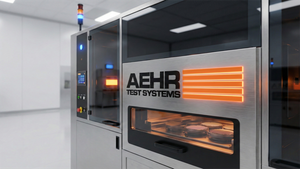

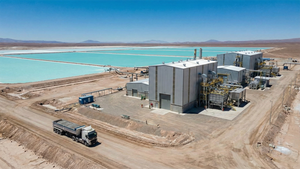

Recent Quotes
View MoreQuotes delayed at least 20 minutes.
By accessing this page, you agree to the Privacy Policy and Terms Of Service.




